Business Communication: HR Director Strategy Analysis Report
VerifiedAdded on 2020/10/05
|9
|2151
|380
Report
AI Summary
This report delves into the principles and purposes of business communication, emphasizing its vital role in information sharing within and outside organizations for achieving objectives. It analyzes the communication strategies an HR director should consider, the characteristics of effective meeting participants (both speakers and listeners), and evaluates the strengths and weaknesses of oral and written communication in a business context. The report highlights the importance of clarity, feedback, and adequate information in communication strategies, as well as the key qualities of good speakers and listeners. It also provides a comparative analysis of oral and written communication, discussing their respective advantages and disadvantages in terms of business applications, along with suggestions for improvement. The conclusion reinforces the significance of effective communication for enhancing productivity and efficiency.
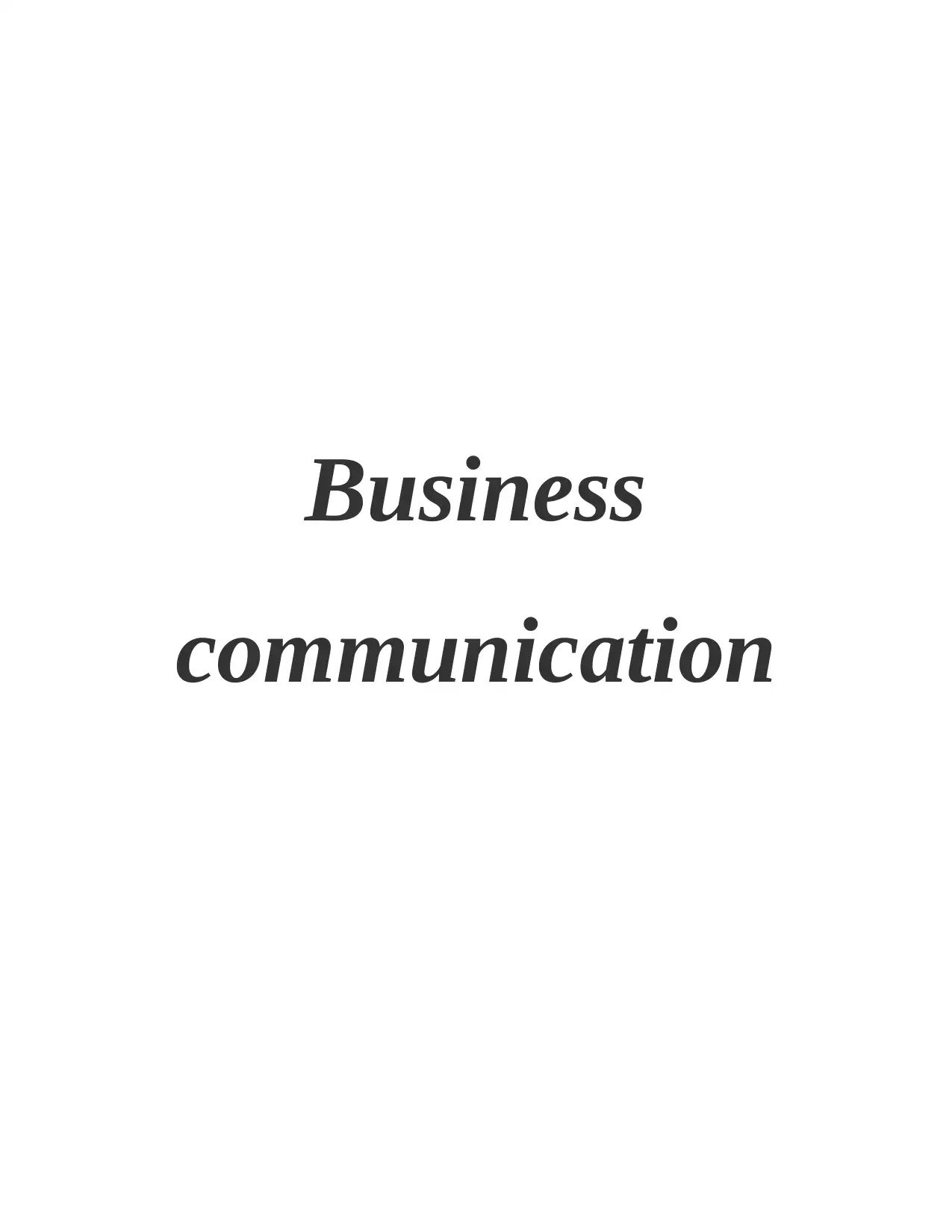
Business
communication
communication
Paraphrase This Document
Need a fresh take? Get an instant paraphrase of this document with our AI Paraphraser
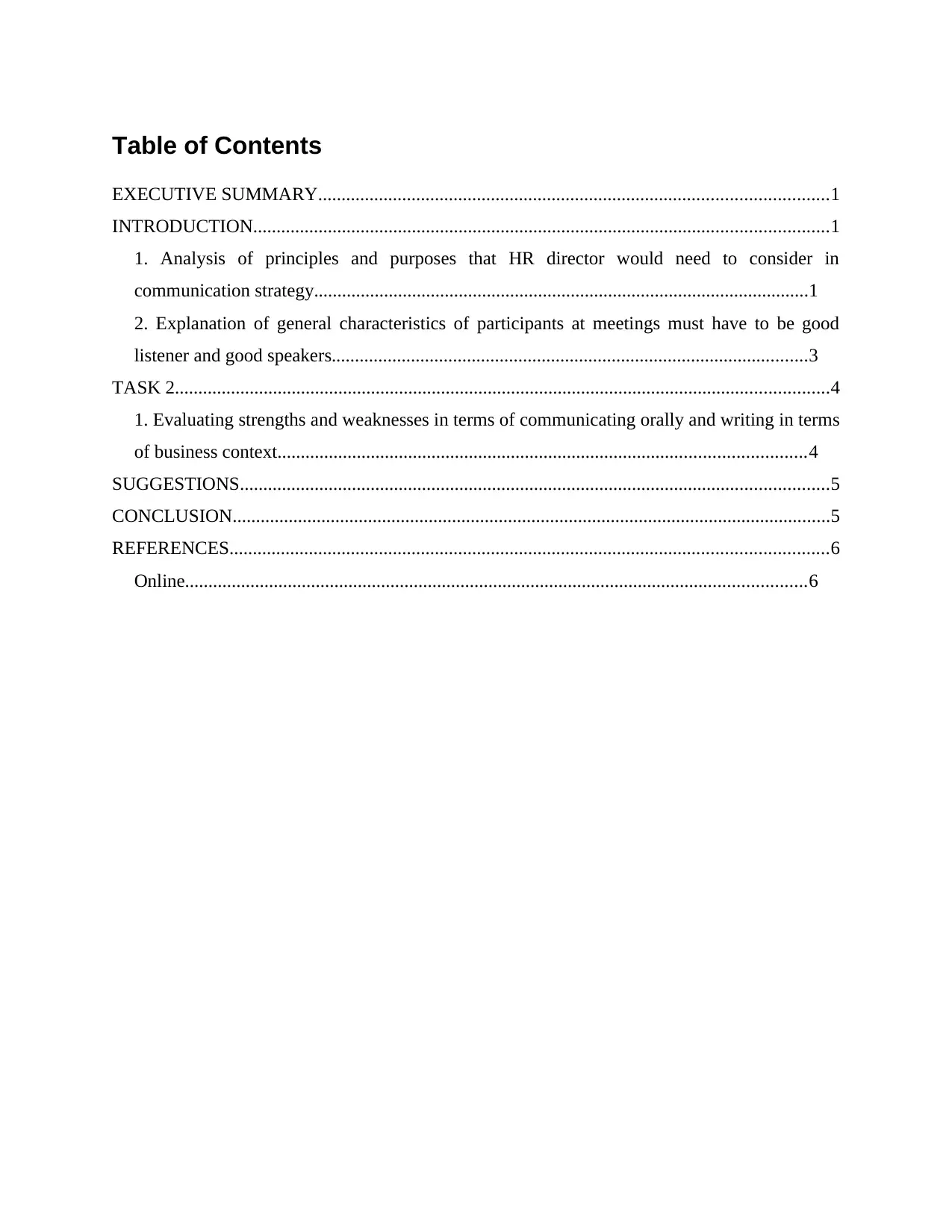
Table of Contents
EXECUTIVE SUMMARY.............................................................................................................1
INTRODUCTION...........................................................................................................................1
1. Analysis of principles and purposes that HR director would need to consider in
communication strategy..........................................................................................................1
2. Explanation of general characteristics of participants at meetings must have to be good
listener and good speakers......................................................................................................3
TASK 2............................................................................................................................................4
1. Evaluating strengths and weaknesses in terms of communicating orally and writing in terms
of business context.................................................................................................................4
SUGGESTIONS..............................................................................................................................5
CONCLUSION................................................................................................................................5
REFERENCES................................................................................................................................6
Online.....................................................................................................................................6
EXECUTIVE SUMMARY.............................................................................................................1
INTRODUCTION...........................................................................................................................1
1. Analysis of principles and purposes that HR director would need to consider in
communication strategy..........................................................................................................1
2. Explanation of general characteristics of participants at meetings must have to be good
listener and good speakers......................................................................................................3
TASK 2............................................................................................................................................4
1. Evaluating strengths and weaknesses in terms of communicating orally and writing in terms
of business context.................................................................................................................4
SUGGESTIONS..............................................................................................................................5
CONCLUSION................................................................................................................................5
REFERENCES................................................................................................................................6
Online.....................................................................................................................................6
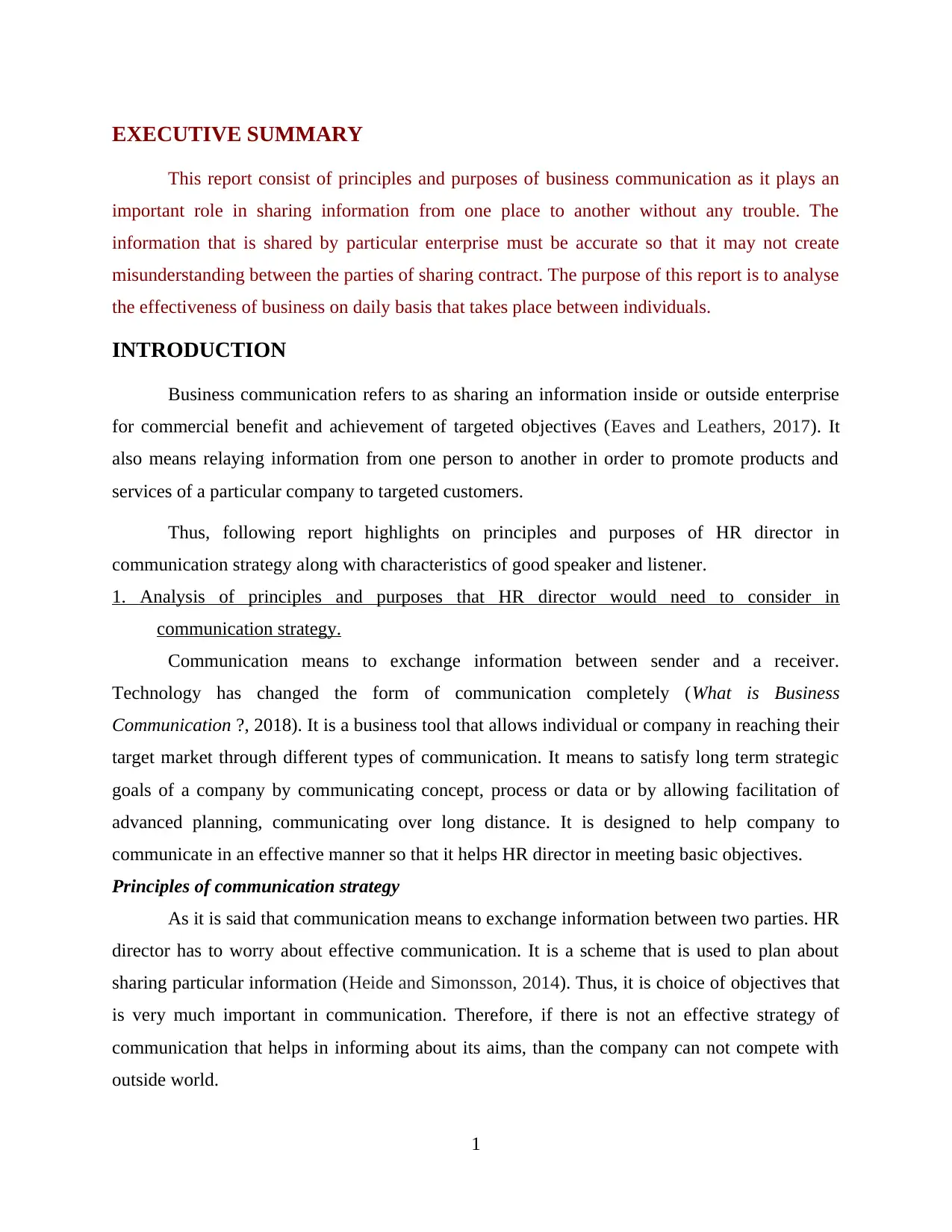
EXECUTIVE SUMMARY
This report consist of principles and purposes of business communication as it plays an
important role in sharing information from one place to another without any trouble. The
information that is shared by particular enterprise must be accurate so that it may not create
misunderstanding between the parties of sharing contract. The purpose of this report is to analyse
the effectiveness of business on daily basis that takes place between individuals.
INTRODUCTION
Business communication refers to as sharing an information inside or outside enterprise
for commercial benefit and achievement of targeted objectives (Eaves and Leathers, 2017). It
also means relaying information from one person to another in order to promote products and
services of a particular company to targeted customers.
Thus, following report highlights on principles and purposes of HR director in
communication strategy along with characteristics of good speaker and listener.
1. Analysis of principles and purposes that HR director would need to consider in
communication strategy.
Communication means to exchange information between sender and a receiver.
Technology has changed the form of communication completely (What is Business
Communication ?, 2018). It is a business tool that allows individual or company in reaching their
target market through different types of communication. It means to satisfy long term strategic
goals of a company by communicating concept, process or data or by allowing facilitation of
advanced planning, communicating over long distance. It is designed to help company to
communicate in an effective manner so that it helps HR director in meeting basic objectives.
Principles of communication strategy
As it is said that communication means to exchange information between two parties. HR
director has to worry about effective communication. It is a scheme that is used to plan about
sharing particular information (Heide and Simonsson, 2014). Thus, it is choice of objectives that
is very much important in communication. Therefore, if there is not an effective strategy of
communication that helps in informing about its aims, than the company can not compete with
outside world.
1
This report consist of principles and purposes of business communication as it plays an
important role in sharing information from one place to another without any trouble. The
information that is shared by particular enterprise must be accurate so that it may not create
misunderstanding between the parties of sharing contract. The purpose of this report is to analyse
the effectiveness of business on daily basis that takes place between individuals.
INTRODUCTION
Business communication refers to as sharing an information inside or outside enterprise
for commercial benefit and achievement of targeted objectives (Eaves and Leathers, 2017). It
also means relaying information from one person to another in order to promote products and
services of a particular company to targeted customers.
Thus, following report highlights on principles and purposes of HR director in
communication strategy along with characteristics of good speaker and listener.
1. Analysis of principles and purposes that HR director would need to consider in
communication strategy.
Communication means to exchange information between sender and a receiver.
Technology has changed the form of communication completely (What is Business
Communication ?, 2018). It is a business tool that allows individual or company in reaching their
target market through different types of communication. It means to satisfy long term strategic
goals of a company by communicating concept, process or data or by allowing facilitation of
advanced planning, communicating over long distance. It is designed to help company to
communicate in an effective manner so that it helps HR director in meeting basic objectives.
Principles of communication strategy
As it is said that communication means to exchange information between two parties. HR
director has to worry about effective communication. It is a scheme that is used to plan about
sharing particular information (Heide and Simonsson, 2014). Thus, it is choice of objectives that
is very much important in communication. Therefore, if there is not an effective strategy of
communication that helps in informing about its aims, than the company can not compete with
outside world.
1
⊘ This is a preview!⊘
Do you want full access?
Subscribe today to unlock all pages.

Trusted by 1+ million students worldwide
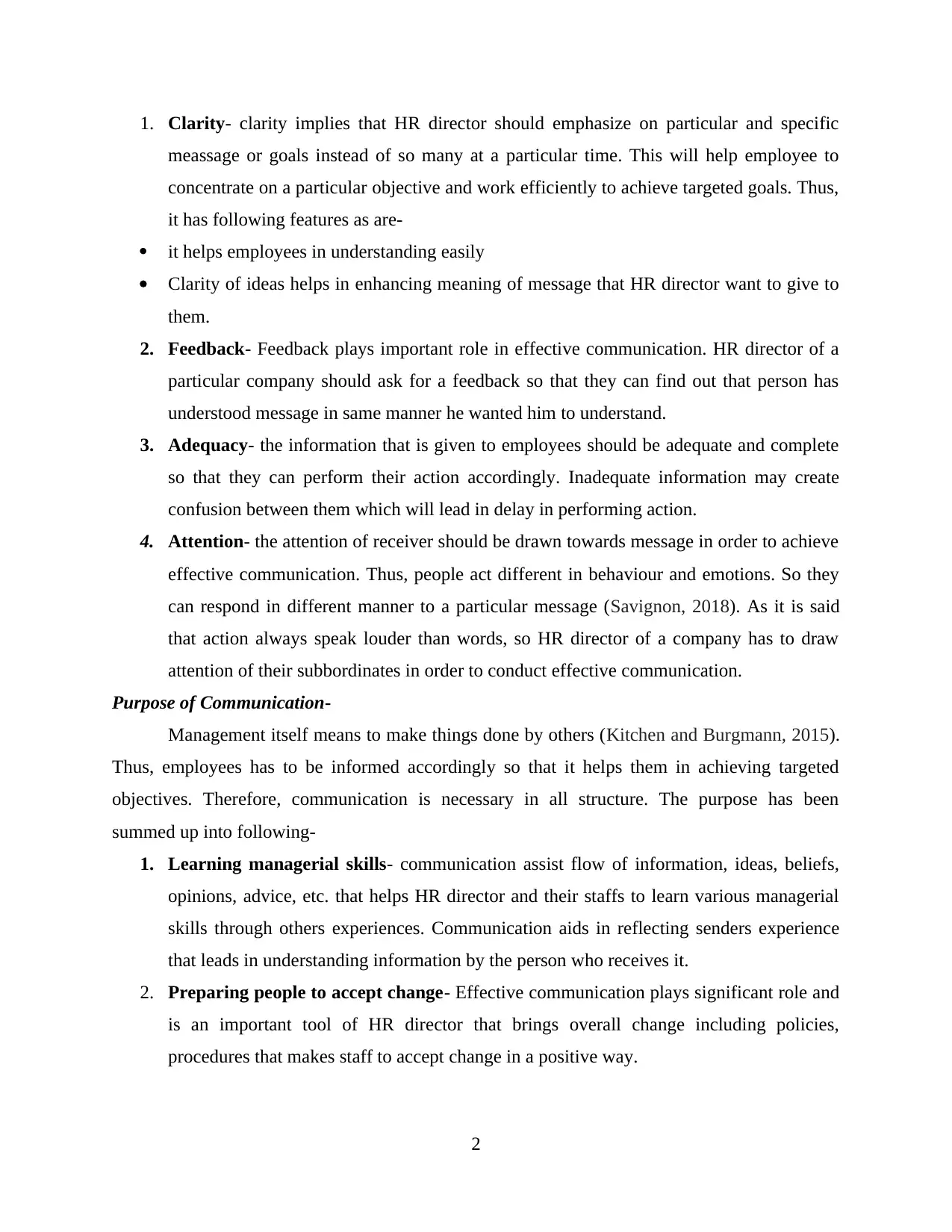
1. Clarity- clarity implies that HR director should emphasize on particular and specific
meassage or goals instead of so many at a particular time. This will help employee to
concentrate on a particular objective and work efficiently to achieve targeted goals. Thus,
it has following features as are-
it helps employees in understanding easily
Clarity of ideas helps in enhancing meaning of message that HR director want to give to
them.
2. Feedback- Feedback plays important role in effective communication. HR director of a
particular company should ask for a feedback so that they can find out that person has
understood message in same manner he wanted him to understand.
3. Adequacy- the information that is given to employees should be adequate and complete
so that they can perform their action accordingly. Inadequate information may create
confusion between them which will lead in delay in performing action.
4. Attention- the attention of receiver should be drawn towards message in order to achieve
effective communication. Thus, people act different in behaviour and emotions. So they
can respond in different manner to a particular message (Savignon, 2018). As it is said
that action always speak louder than words, so HR director of a company has to draw
attention of their subbordinates in order to conduct effective communication.
Purpose of Communication-
Management itself means to make things done by others (Kitchen and Burgmann, 2015).
Thus, employees has to be informed accordingly so that it helps them in achieving targeted
objectives. Therefore, communication is necessary in all structure. The purpose has been
summed up into following-
1. Learning managerial skills- communication assist flow of information, ideas, beliefs,
opinions, advice, etc. that helps HR director and their staffs to learn various managerial
skills through others experiences. Communication aids in reflecting senders experience
that leads in understanding information by the person who receives it.
2. Preparing people to accept change- Effective communication plays significant role and
is an important tool of HR director that brings overall change including policies,
procedures that makes staff to accept change in a positive way.
2
meassage or goals instead of so many at a particular time. This will help employee to
concentrate on a particular objective and work efficiently to achieve targeted goals. Thus,
it has following features as are-
it helps employees in understanding easily
Clarity of ideas helps in enhancing meaning of message that HR director want to give to
them.
2. Feedback- Feedback plays important role in effective communication. HR director of a
particular company should ask for a feedback so that they can find out that person has
understood message in same manner he wanted him to understand.
3. Adequacy- the information that is given to employees should be adequate and complete
so that they can perform their action accordingly. Inadequate information may create
confusion between them which will lead in delay in performing action.
4. Attention- the attention of receiver should be drawn towards message in order to achieve
effective communication. Thus, people act different in behaviour and emotions. So they
can respond in different manner to a particular message (Savignon, 2018). As it is said
that action always speak louder than words, so HR director of a company has to draw
attention of their subbordinates in order to conduct effective communication.
Purpose of Communication-
Management itself means to make things done by others (Kitchen and Burgmann, 2015).
Thus, employees has to be informed accordingly so that it helps them in achieving targeted
objectives. Therefore, communication is necessary in all structure. The purpose has been
summed up into following-
1. Learning managerial skills- communication assist flow of information, ideas, beliefs,
opinions, advice, etc. that helps HR director and their staffs to learn various managerial
skills through others experiences. Communication aids in reflecting senders experience
that leads in understanding information by the person who receives it.
2. Preparing people to accept change- Effective communication plays significant role and
is an important tool of HR director that brings overall change including policies,
procedures that makes staff to accept change in a positive way.
2
Paraphrase This Document
Need a fresh take? Get an instant paraphrase of this document with our AI Paraphraser
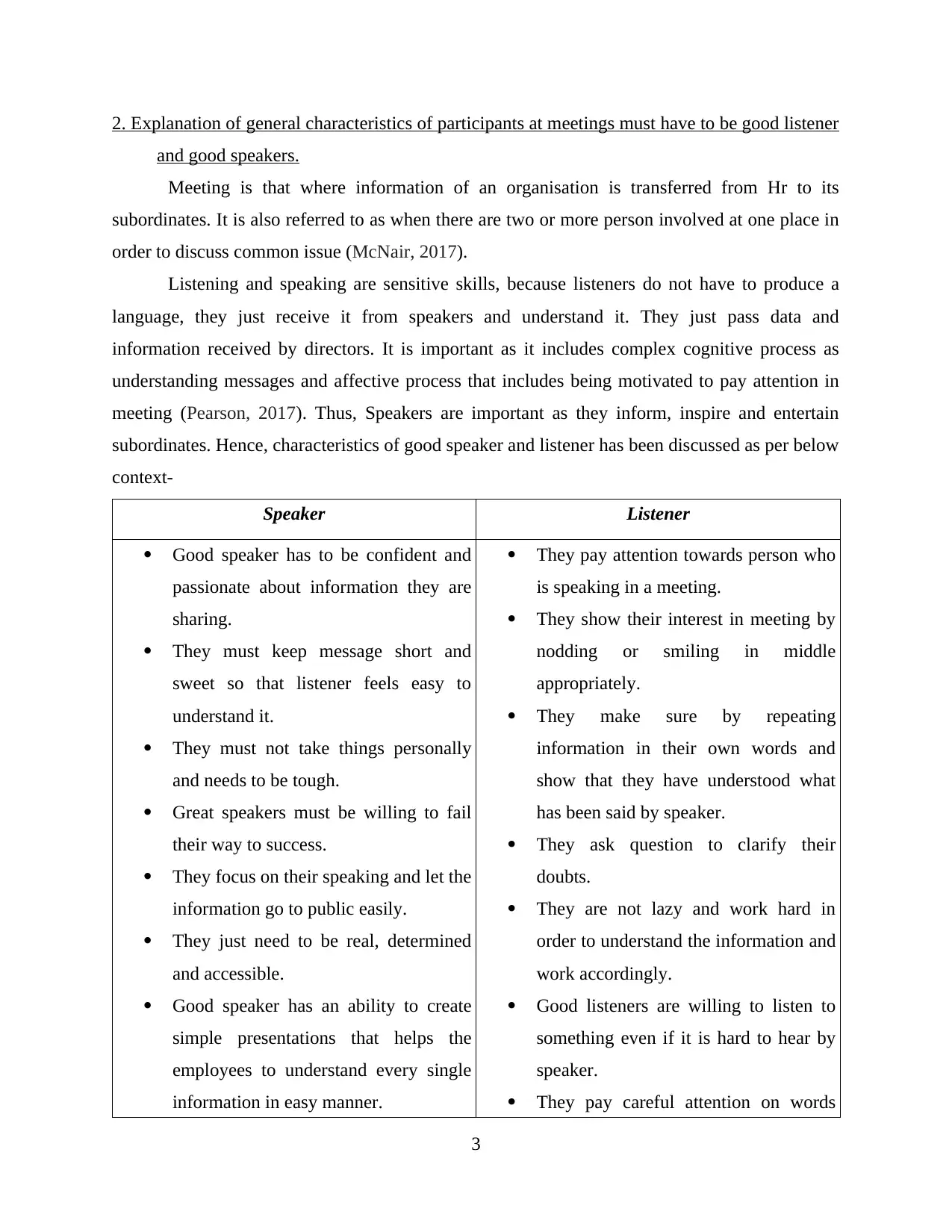
2. Explanation of general characteristics of participants at meetings must have to be good listener
and good speakers.
Meeting is that where information of an organisation is transferred from Hr to its
subordinates. It is also referred to as when there are two or more person involved at one place in
order to discuss common issue (McNair, 2017).
Listening and speaking are sensitive skills, because listeners do not have to produce a
language, they just receive it from speakers and understand it. They just pass data and
information received by directors. It is important as it includes complex cognitive process as
understanding messages and affective process that includes being motivated to pay attention in
meeting (Pearson, 2017). Thus, Speakers are important as they inform, inspire and entertain
subordinates. Hence, characteristics of good speaker and listener has been discussed as per below
context-
Speaker Listener
Good speaker has to be confident and
passionate about information they are
sharing.
They must keep message short and
sweet so that listener feels easy to
understand it.
They must not take things personally
and needs to be tough.
Great speakers must be willing to fail
their way to success.
They focus on their speaking and let the
information go to public easily.
They just need to be real, determined
and accessible.
Good speaker has an ability to create
simple presentations that helps the
employees to understand every single
information in easy manner.
They pay attention towards person who
is speaking in a meeting.
They show their interest in meeting by
nodding or smiling in middle
appropriately.
They make sure by repeating
information in their own words and
show that they have understood what
has been said by speaker.
They ask question to clarify their
doubts.
They are not lazy and work hard in
order to understand the information and
work accordingly.
Good listeners are willing to listen to
something even if it is hard to hear by
speaker.
They pay careful attention on words
3
and good speakers.
Meeting is that where information of an organisation is transferred from Hr to its
subordinates. It is also referred to as when there are two or more person involved at one place in
order to discuss common issue (McNair, 2017).
Listening and speaking are sensitive skills, because listeners do not have to produce a
language, they just receive it from speakers and understand it. They just pass data and
information received by directors. It is important as it includes complex cognitive process as
understanding messages and affective process that includes being motivated to pay attention in
meeting (Pearson, 2017). Thus, Speakers are important as they inform, inspire and entertain
subordinates. Hence, characteristics of good speaker and listener has been discussed as per below
context-
Speaker Listener
Good speaker has to be confident and
passionate about information they are
sharing.
They must keep message short and
sweet so that listener feels easy to
understand it.
They must not take things personally
and needs to be tough.
Great speakers must be willing to fail
their way to success.
They focus on their speaking and let the
information go to public easily.
They just need to be real, determined
and accessible.
Good speaker has an ability to create
simple presentations that helps the
employees to understand every single
information in easy manner.
They pay attention towards person who
is speaking in a meeting.
They show their interest in meeting by
nodding or smiling in middle
appropriately.
They make sure by repeating
information in their own words and
show that they have understood what
has been said by speaker.
They ask question to clarify their
doubts.
They are not lazy and work hard in
order to understand the information and
work accordingly.
Good listeners are willing to listen to
something even if it is hard to hear by
speaker.
They pay careful attention on words
3
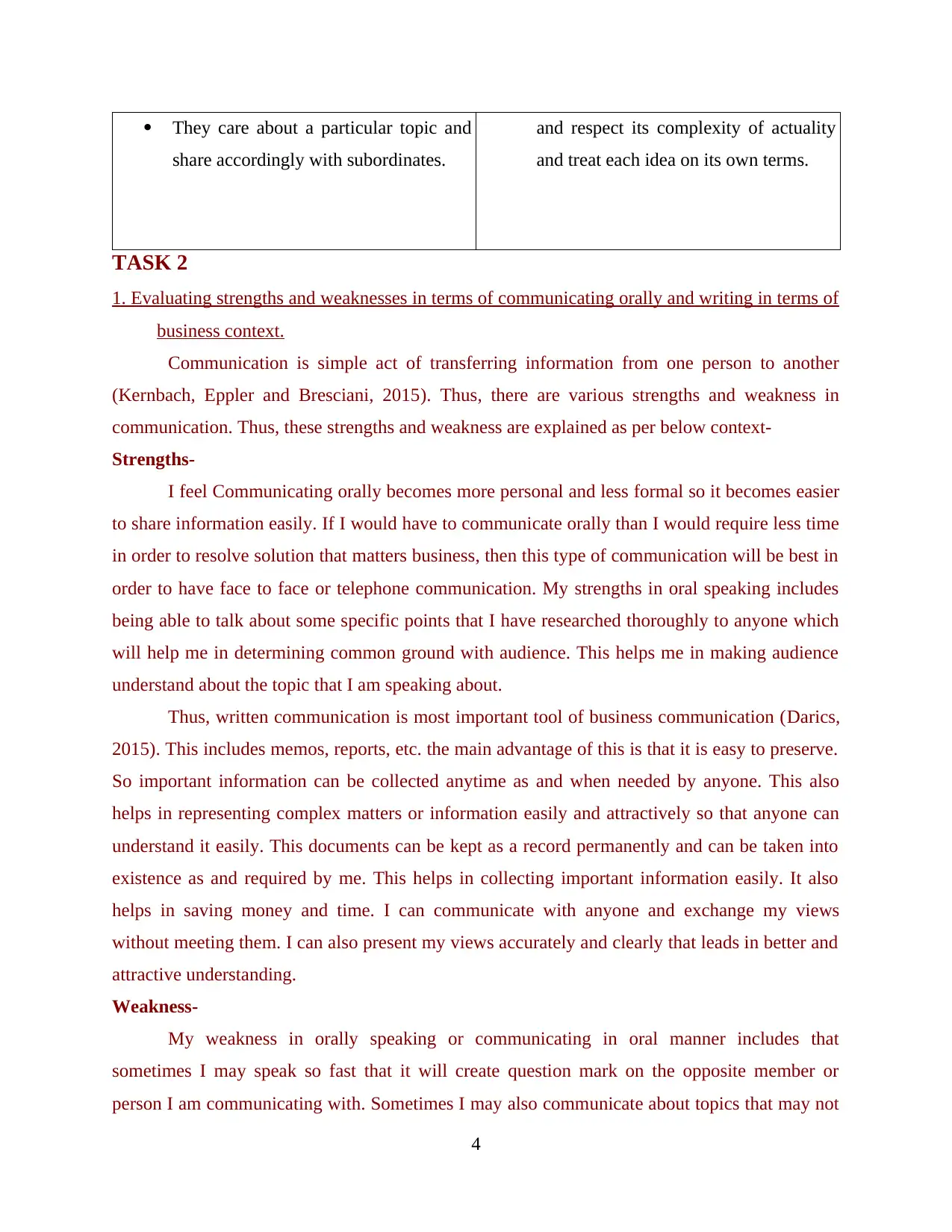
They care about a particular topic and
share accordingly with subordinates.
and respect its complexity of actuality
and treat each idea on its own terms.
TASK 2
1. Evaluating strengths and weaknesses in terms of communicating orally and writing in terms of
business context.
Communication is simple act of transferring information from one person to another
(Kernbach, Eppler and Bresciani, 2015). Thus, there are various strengths and weakness in
communication. Thus, these strengths and weakness are explained as per below context-
Strengths-
I feel Communicating orally becomes more personal and less formal so it becomes easier
to share information easily. If I would have to communicate orally than I would require less time
in order to resolve solution that matters business, then this type of communication will be best in
order to have face to face or telephone communication. My strengths in oral speaking includes
being able to talk about some specific points that I have researched thoroughly to anyone which
will help me in determining common ground with audience. This helps me in making audience
understand about the topic that I am speaking about.
Thus, written communication is most important tool of business communication (Darics,
2015). This includes memos, reports, etc. the main advantage of this is that it is easy to preserve.
So important information can be collected anytime as and when needed by anyone. This also
helps in representing complex matters or information easily and attractively so that anyone can
understand it easily. This documents can be kept as a record permanently and can be taken into
existence as and required by me. This helps in collecting important information easily. It also
helps in saving money and time. I can communicate with anyone and exchange my views
without meeting them. I can also present my views accurately and clearly that leads in better and
attractive understanding.
Weakness-
My weakness in orally speaking or communicating in oral manner includes that
sometimes I may speak so fast that it will create question mark on the opposite member or
person I am communicating with. Sometimes I may also communicate about topics that may not
4
share accordingly with subordinates.
and respect its complexity of actuality
and treat each idea on its own terms.
TASK 2
1. Evaluating strengths and weaknesses in terms of communicating orally and writing in terms of
business context.
Communication is simple act of transferring information from one person to another
(Kernbach, Eppler and Bresciani, 2015). Thus, there are various strengths and weakness in
communication. Thus, these strengths and weakness are explained as per below context-
Strengths-
I feel Communicating orally becomes more personal and less formal so it becomes easier
to share information easily. If I would have to communicate orally than I would require less time
in order to resolve solution that matters business, then this type of communication will be best in
order to have face to face or telephone communication. My strengths in oral speaking includes
being able to talk about some specific points that I have researched thoroughly to anyone which
will help me in determining common ground with audience. This helps me in making audience
understand about the topic that I am speaking about.
Thus, written communication is most important tool of business communication (Darics,
2015). This includes memos, reports, etc. the main advantage of this is that it is easy to preserve.
So important information can be collected anytime as and when needed by anyone. This also
helps in representing complex matters or information easily and attractively so that anyone can
understand it easily. This documents can be kept as a record permanently and can be taken into
existence as and required by me. This helps in collecting important information easily. It also
helps in saving money and time. I can communicate with anyone and exchange my views
without meeting them. I can also present my views accurately and clearly that leads in better and
attractive understanding.
Weakness-
My weakness in orally speaking or communicating in oral manner includes that
sometimes I may speak so fast that it will create question mark on the opposite member or
person I am communicating with. Sometimes I may also communicate about topics that may not
4
⊘ This is a preview!⊘
Do you want full access?
Subscribe today to unlock all pages.

Trusted by 1+ million students worldwide
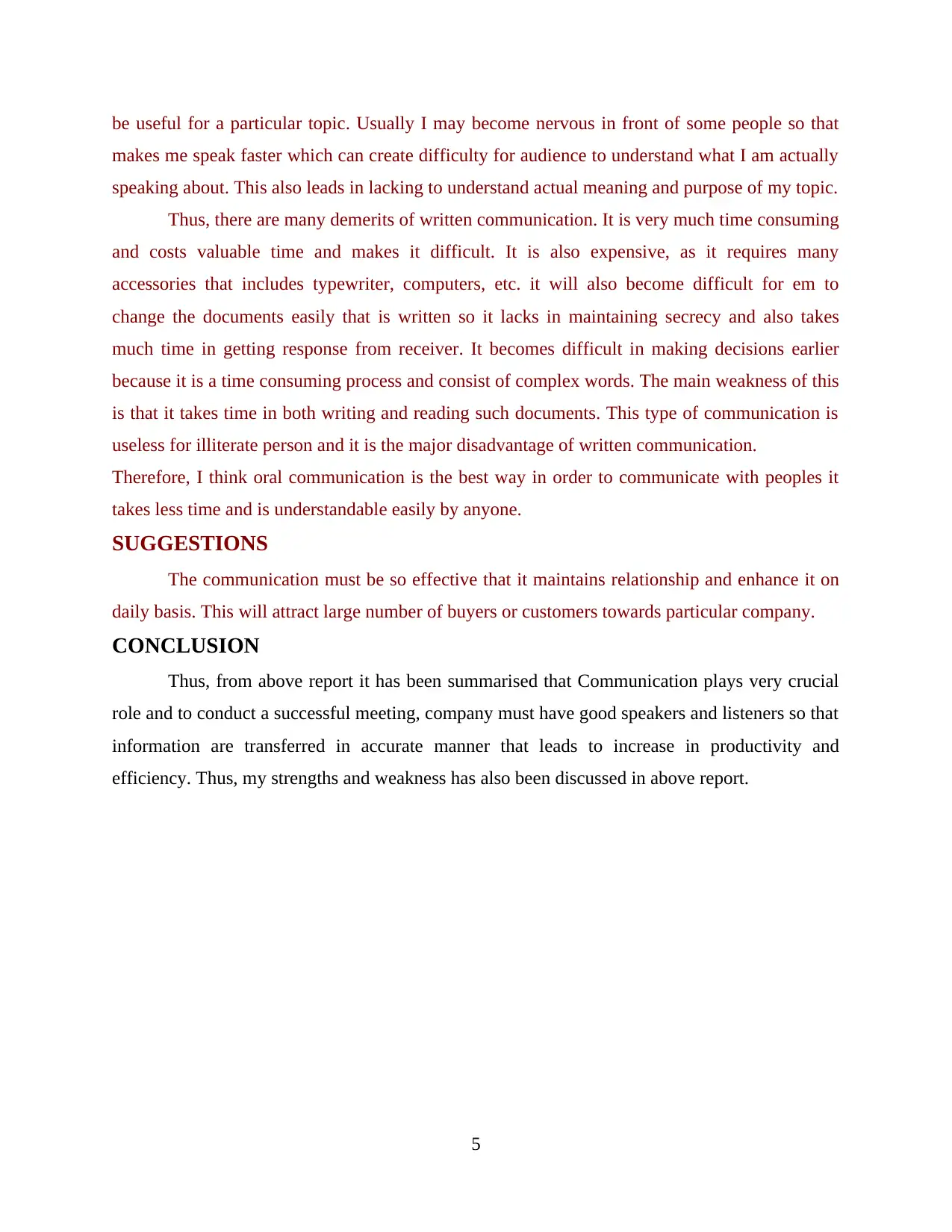
be useful for a particular topic. Usually I may become nervous in front of some people so that
makes me speak faster which can create difficulty for audience to understand what I am actually
speaking about. This also leads in lacking to understand actual meaning and purpose of my topic.
Thus, there are many demerits of written communication. It is very much time consuming
and costs valuable time and makes it difficult. It is also expensive, as it requires many
accessories that includes typewriter, computers, etc. it will also become difficult for em to
change the documents easily that is written so it lacks in maintaining secrecy and also takes
much time in getting response from receiver. It becomes difficult in making decisions earlier
because it is a time consuming process and consist of complex words. The main weakness of this
is that it takes time in both writing and reading such documents. This type of communication is
useless for illiterate person and it is the major disadvantage of written communication.
Therefore, I think oral communication is the best way in order to communicate with peoples it
takes less time and is understandable easily by anyone.
SUGGESTIONS
The communication must be so effective that it maintains relationship and enhance it on
daily basis. This will attract large number of buyers or customers towards particular company.
CONCLUSION
Thus, from above report it has been summarised that Communication plays very crucial
role and to conduct a successful meeting, company must have good speakers and listeners so that
information are transferred in accurate manner that leads to increase in productivity and
efficiency. Thus, my strengths and weakness has also been discussed in above report.
5
makes me speak faster which can create difficulty for audience to understand what I am actually
speaking about. This also leads in lacking to understand actual meaning and purpose of my topic.
Thus, there are many demerits of written communication. It is very much time consuming
and costs valuable time and makes it difficult. It is also expensive, as it requires many
accessories that includes typewriter, computers, etc. it will also become difficult for em to
change the documents easily that is written so it lacks in maintaining secrecy and also takes
much time in getting response from receiver. It becomes difficult in making decisions earlier
because it is a time consuming process and consist of complex words. The main weakness of this
is that it takes time in both writing and reading such documents. This type of communication is
useless for illiterate person and it is the major disadvantage of written communication.
Therefore, I think oral communication is the best way in order to communicate with peoples it
takes less time and is understandable easily by anyone.
SUGGESTIONS
The communication must be so effective that it maintains relationship and enhance it on
daily basis. This will attract large number of buyers or customers towards particular company.
CONCLUSION
Thus, from above report it has been summarised that Communication plays very crucial
role and to conduct a successful meeting, company must have good speakers and listeners so that
information are transferred in accurate manner that leads to increase in productivity and
efficiency. Thus, my strengths and weakness has also been discussed in above report.
5
Paraphrase This Document
Need a fresh take? Get an instant paraphrase of this document with our AI Paraphraser
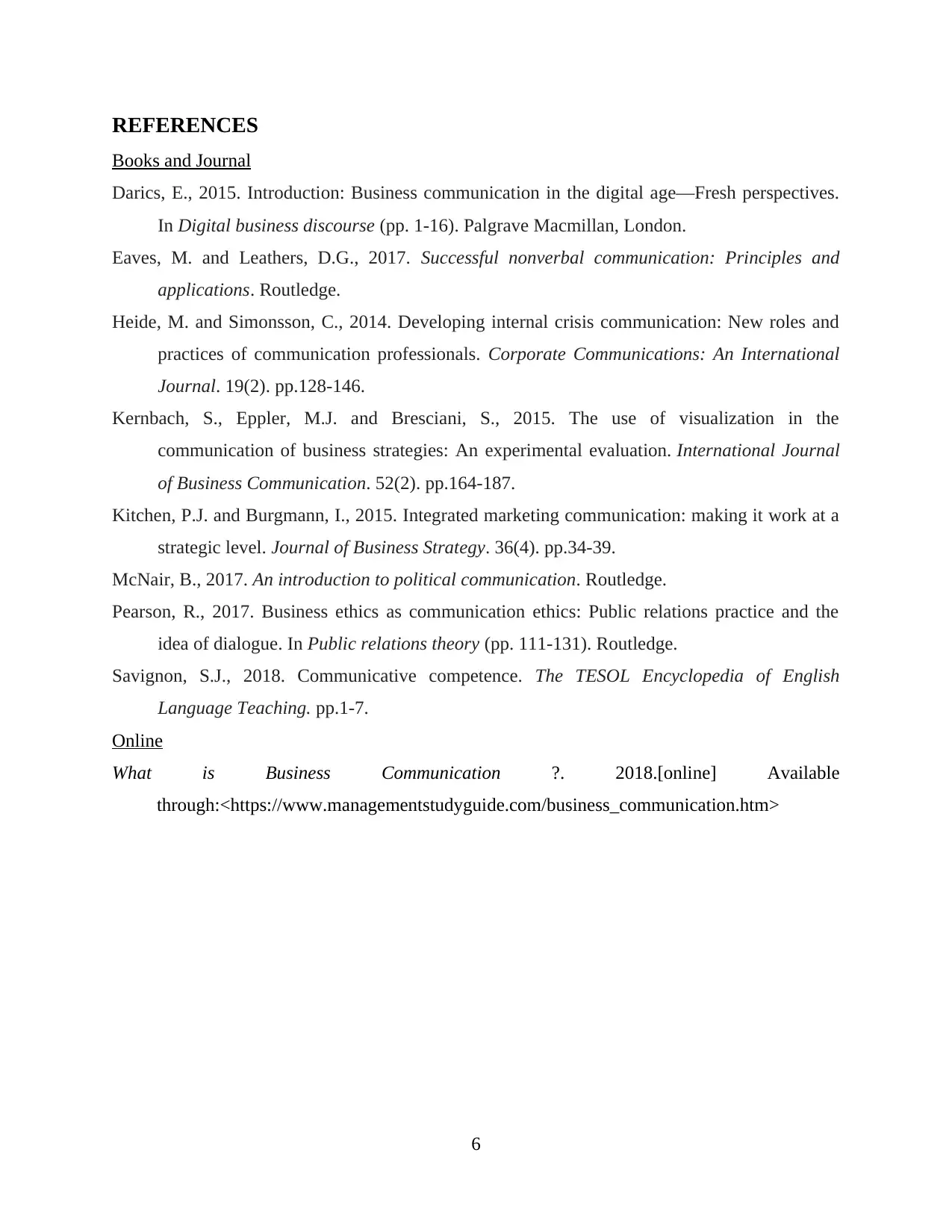
REFERENCES
Books and Journal
Darics, E., 2015. Introduction: Business communication in the digital age—Fresh perspectives.
In Digital business discourse (pp. 1-16). Palgrave Macmillan, London.
Eaves, M. and Leathers, D.G., 2017. Successful nonverbal communication: Principles and
applications. Routledge.
Heide, M. and Simonsson, C., 2014. Developing internal crisis communication: New roles and
practices of communication professionals. Corporate Communications: An International
Journal. 19(2). pp.128-146.
Kernbach, S., Eppler, M.J. and Bresciani, S., 2015. The use of visualization in the
communication of business strategies: An experimental evaluation. International Journal
of Business Communication. 52(2). pp.164-187.
Kitchen, P.J. and Burgmann, I., 2015. Integrated marketing communication: making it work at a
strategic level. Journal of Business Strategy. 36(4). pp.34-39.
McNair, B., 2017. An introduction to political communication. Routledge.
Pearson, R., 2017. Business ethics as communication ethics: Public relations practice and the
idea of dialogue. In Public relations theory (pp. 111-131). Routledge.
Savignon, S.J., 2018. Communicative competence. The TESOL Encyclopedia of English
Language Teaching. pp.1-7.
Online
What is Business Communication ?. 2018.[online] Available
through:<https://www.managementstudyguide.com/business_communication.htm>
6
Books and Journal
Darics, E., 2015. Introduction: Business communication in the digital age—Fresh perspectives.
In Digital business discourse (pp. 1-16). Palgrave Macmillan, London.
Eaves, M. and Leathers, D.G., 2017. Successful nonverbal communication: Principles and
applications. Routledge.
Heide, M. and Simonsson, C., 2014. Developing internal crisis communication: New roles and
practices of communication professionals. Corporate Communications: An International
Journal. 19(2). pp.128-146.
Kernbach, S., Eppler, M.J. and Bresciani, S., 2015. The use of visualization in the
communication of business strategies: An experimental evaluation. International Journal
of Business Communication. 52(2). pp.164-187.
Kitchen, P.J. and Burgmann, I., 2015. Integrated marketing communication: making it work at a
strategic level. Journal of Business Strategy. 36(4). pp.34-39.
McNair, B., 2017. An introduction to political communication. Routledge.
Pearson, R., 2017. Business ethics as communication ethics: Public relations practice and the
idea of dialogue. In Public relations theory (pp. 111-131). Routledge.
Savignon, S.J., 2018. Communicative competence. The TESOL Encyclopedia of English
Language Teaching. pp.1-7.
Online
What is Business Communication ?. 2018.[online] Available
through:<https://www.managementstudyguide.com/business_communication.htm>
6

7
⊘ This is a preview!⊘
Do you want full access?
Subscribe today to unlock all pages.

Trusted by 1+ million students worldwide
1 out of 9
Related Documents
Your All-in-One AI-Powered Toolkit for Academic Success.
+13062052269
info@desklib.com
Available 24*7 on WhatsApp / Email
![[object Object]](/_next/static/media/star-bottom.7253800d.svg)
Unlock your academic potential
Copyright © 2020–2026 A2Z Services. All Rights Reserved. Developed and managed by ZUCOL.





